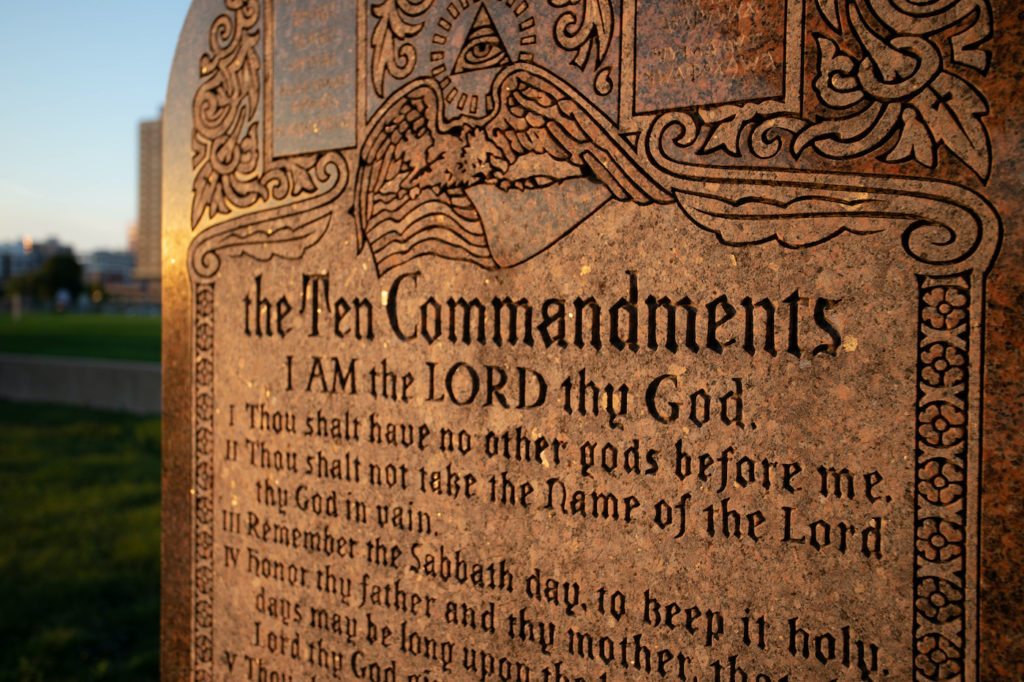Far too many accounts of Western intellectual history claim that natural rights were largely unknown until brilliant Enlightenment thinkers discovered them. Christians, it is commonly asserted, opposed these rights, especially the freedom of conscience.
John Witte, Jr. tells a very different tale in The Blessings of Liberty: Human Rights and Religious Freedom in the Western Legal Tradition. He contends that natural rights are found in the Bible, were developed by Christian thinkers, and played an important role in the West long before Enlightenment thinkers wrote about them.
Few academics are better equipped to make this argument than Witte, the Woodruff University Professor, McDonald Distinguished Professor, and Director of the Center for the Study of Law and Religion at Emory University. Witte has authored or edited more than forty books and three hundred articles, many of which are on the relationship between religion and law. The Blessings of Liberty mostly comprises previously published works, but they have been updated and repurposed into a coherent book.
The volume provides well-researched insights not just into natural rights in Christian thought, but also into the significant role of a particular right—religious liberty—in Western law and politics. Witte also offers an excellent overview of the status of religious liberty and church–state relations in the United States and Europe.
Start your day with Public Discourse
Sign up and get our daily essays sent straight to your inbox.Biblical and Philosophical Roots
Well before the Enlightenment, natural rights played an important role in Western political and legal philosophy. We learn from Witte that while the Bible seldom uses the language of rights, its teaching that humans are made in the imago Dei, the image of God, “forms the deep ontological foundation of a Christian theory of human dignity, human freedom, and human rights.” All humans, regardless of race, gender, class, etc. must be treated with respect and dignity. The New Testament reemphasizes the latter point, as when the Apostle Paul observes that there “is neither Jew nor Greek, there is neither slave nor free, there is neither male nor female; for you are all one in Christ Jesus.”
Christian thinkers have historically grounded human rights in the Bible, but of course one does not need to be a Christian to understand that natural rights exist. The Romans used the Latin term ius, which is usually translated as “right,” in both an objective and subjective sense. Most references to ius in Roman legal texts referred to an objective sense of right, i.e., what is proper and required. But it was also used in a subjective sense, i.e., a right possessed by an individual that could be vindicated against the government.
The Protestant Reformation tore Christendom asunder, and Reformers radically altered the way rights were understood. They emphasized the distinct roles of different God-ordained institutions, e.g., family, church, and state; they firmly grounded rights in duties prescribed by biblical texts; and, most significantly, they placed a new emphasis on the importance of the ability of individuals to be free to worship God and live according to His Word.
Enlightenment thinkers built on and developed these earlier ideas that emerged from classical and Christian thought, often emphasizing their universal application. By the twentieth century, the language of rights had spread across the globe, a reality reflected well by the Universal Declaration on Human Rights.
Establishment and Religious Freedom
The Blessings of Liberty is concerned with the development of human rights in general, but also focuses on religious freedom more narrowly. The book’s middle four chapters consider the political transition first from strict formal establishments to religious toleration, then eventually to religious liberty and disestablishment in the American colonies, states, and nation. The development of these arrangements can instruct contemporary Americans in how to think about religious freedom and establishment within today’s pluralistic conditions.
Whether religious freedom and establishment can coexist largely depends on what is meant by a religious establishment.
Among the vexing questions that emerged during the Founding era is whether religious liberty and a religious establishment can coexist. The Massachusetts constitution of 1780 protects the religious liberty of all citizens, but also created an established church; albeit one that was, in John Adams’s words, “a most mild and equitable establishment of religion.”
Whether religious freedom and establishment can coexist largely depends on what is meant by a religious establishment. Witte argues that Massachusetts’s 1780 constitution created several different establishments: ceremonial, moral, and institutional. The ceremonial establishment is evident in the preamble, which recognizes “the goodness of the great Legislator of the universe” who, in His Providence, has blessed the people of the state. This language, which remains in the Massachusetts constitution to this day, has no practical effect and does not impinge on the religious liberty of the state’s citizens. Indeed, the constitutions of all fifty states reference the Deity, which is evidently the Christian God, given the eras in which they were written. Reasonable people can debate whether such language should be removed, but there is no good reason to think that these words restrict anyone’s religious freedom.
The Massachusetts constitution of 1780 also created a moral establishment by recognizing, among other things, that religion generates the sort of moral citizenry necessary for republican governments to work. Moreover, the constitution insisted that legislators must be moral citizens and that voters must hold them accountable. Again, it is not evident that these hortatory passages restrain anyone’s religious liberty.
Finally, this constitution created an institutional establishment. Article III permitted towns to impose taxes “for the support and maintenance of public protestant teachers of piety, religion, and morality.” Although obviously biased toward Protestantism, it is noteworthy that no denomination is specified. But it was the case that the overwhelming majority of citizens were Congregationalists, so in practice most tax revenues went to support Congregational churches and ministers. When the constitution was first ratified, conservative Calvinists liked this arrangement just fine—but that changed once tax dollars began to support Unitarian congregations and minsters. When this started, they joined with dissenters to end the formal, institutional establishment in 1833. By directing public funds overwhelmingly in favor of a single denomination, institutional establishment—more than moral or ceremonial establishment—could burden religious freedom.
After exploring founding-era debates about religious liberty and church–state relations in Massachusetts, Witte turns to other states and the nation as a whole. He contends that “America’s founders adopted and advocated six major principles of religious freedom: (1) liberty of conscience, (2) free exercise of religion, (3) religious pluralism, (4) religious equality, (5) separation of church and state, (6) no establishment of a national religion.” By the Founding era, almost everyone agreed that there should be no compulsion in matters of faith and that citizens should be free to act on their religious convictions whenever possible. Also by this time, states began turning from religious establishments and accepting the fact of religious pluralism.
There is a sense in which the Founders embraced religious equality and the separation of church and state, but we should not think they understood these ideas to require outcomes desired by contemporary organizations like Americans United for Separation of Church and State. As I have shown elsewhere, they saw no problem with presidents’ issuing explicitly Christian thanksgiving day proclamations, hiring only Christian chaplains, using Christian language or images on public monuments, etc.
Advocacy groups such as Americans United regularly argue that the Establishment Clause prohibits government aid to religious schools, or exemptions from neutral laws that protect religious citizens (almost always of minority faiths), or tax exemptions for houses of worship and religious organizations. Witte makes it abundantly clear that these things are permitted if we interpret the Establishment Clause as it was understood by the men who drafted and ratified it. Strictly speaking, this original understanding would allow governments to favor Christianity over other religions.
Nonetheless, there are excellent prudential reasons for governments to treat all religions equally. When the national government exempts pacifists from military service, it should exempt all pacifists, not just members of historic peace churches as the Selective Service Act of 1917 did. And if states are going to provide aid to private schools, they should provide it equally to all private schools, not just those of some favored religious tradition. Such evenhandedness prevents political divisions and promotes social unity.
There is a sense in which the Founders embraced religious equality and the separation of church and state, but we should not think they understood these ideas to require outcomes desired by contemporary organizations like Americans United for Separation of Church and State.
Religious Liberty in Europe
The last several substantive chapters turn to religious liberty and church–state relations in Europe. Witte describes a number of different cases decided by the European Court of Human Rights in Strasbourg and the Court of Justice of the European Union, but I’ll only discuss the most troubling of these decisions. Both courts have upheld policies that prohibit Islamic women from wearing hijabs and hinder Muslims from slaughtering cattle in the way dictated by their faith. European law requires that animals be stunned before being slaughtered, whereas some Muslims (and Jews) believe that animals must be awake when slaughtered if the meat is to be halal (or kosher). The law does provide an exemption for citizens who hold this belief, but only if the religious slaughtering is performed in a licensed slaughterhouse. This requirement hinders Muslims’ ability to obtain enough halal meat for holidays such as Eid al-Adha.
Even worse, Flemish authorities passed a law requiring Islamic and Jewish butchers to use a “nonlethal form of stunning before cutting the animal’s throat and letting it bleed out fully.” No such restrictions applied to hunters, fishermen, and other sportsmen. The European Court of Justice found the law to be constitutional, thus upholding “a non-neutral local law that specifically and discriminatorily targets a central religious practice of ritualistic slaughtering that EU law had accommodated on grounds of religious freedom.” These courts’ rulings indicate that the West, especially Europe, has lost sight of religious freedom as the most sacred right. Perhaps this is because the West is becoming increasingly secular, and so the Christian basis for respecting rights has waned. Yet, as is shown by America’s founding thought, there are other grounds for protecting religious freedom, such as the need for a moral citizenry, that other nations can and should adopt.
In his concluding chapter, Witte reflects on the development of human rights, especially the right to religious liberty, in the West. He offers a brief response to Christian academics such as Stanley Hauerwas who criticize rights, and promises to develop these arguments in a future book or two. He contends that Christians need not reject their religious and moral traditions in order to embrace rights, and they certainly do not need to abandon “their duty to God and neighbor.” One can accept that there is a right to private property, for instance, and still generously give to those in need.
The Blessings of Liberty offers a wonderful overview of the development of human rights in the West. Its emphasis on religious liberty is particularly important as some Christian academics question the importance of rights, and far too many scholars question the importance of religious liberty. It also provides a way to think about the relationship between faith and political power in an age of religious diversity. As Witte shows, when Christians and other religious individuals and groups are free to exercise their beliefs, they strengthen society with their moral and intellectual contributions.













